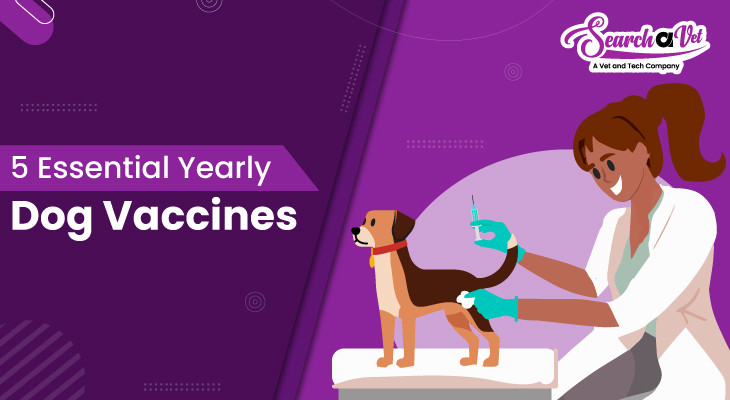5 Essential Yearly Dog Vaccines Every Pet Owner Should Know
 Aug 07, 2024
Aug 07, 2024

It is the wish of every sensitive and caring pet owner to have their pet live a life that is long, healthy, and free from suffering. One of the most critical actions you as a pet owner should take is to ensure that the dog pet you have administrated appropriate vaccines. However, determining which yearly dog vaccines are necessary with many available alternatives may be challenging.
The American Veterinary Medical Association states that dog vaccination helps prevent diseases that are fatal and preventable. Dog vaccinations also play an important role in ensuring the proper health of dogs. Furthermore, research has indicated a dramatic decline in veterinary diseases owing to worldwide vaccination.
This comprehensive guide will shed light on the 5 essential dog vaccines that every responsible owner should know about.
Before moving further to specific vaccines, let's address the "why" behind them.
Why You Should Vaccinate Your Dog
Canine vaccination is an important step toward preserving your dog's health and safety. Vaccinations can help you avoid several deadly illnesses that can result in both short-term discomfort and long-term consequences, including paralysis or even death of your dog. Puppies and aged dogs are more sensitive to infectious diseases, making early vaccines imperative.
The majority of dog vaccinations have a limited duration of efficacy. Consequently, many immunizations require an annual booster dose.
However, some vaccines, such as the 3-year rabies vaccine, need a booster every three years. It is advisable to consult with your veterinarian about developing a personalized vaccination schedule for your dog. Try to schedule yearly dog vaccines even if your dog doesn’t get infected; it ensures their healthy living.
Personalized Vaccines for Your Dog
It is important to remember that every dog is unique. Their age, lifestyle, and location all determine which vaccinations they require.
Although this blog covers the top five annual vaccines, you should discuss with your veterinarian how to create a personalized vaccination plan for your dog. Based on your dog's risk factors, they can assess their needs and recommend further vaccines.
According to a 2023 survey conducted by Banfield Pet Hospitals, 85% of dogs in the United States are up to date on essential vaccines such as rabies, distemper, parvovirus, and leptospirosis. However, vaccination rates for non-core shots such as kennel cough might differ depending on individual requirements and risk factors.
The 5 Essential Yearly Dog Vaccines:
Rabies:
This lethal virus infects animals as well as humans and is almost invariably fatal once symptoms develop. Fortunately, the rabies vaccination is very effective and mandatory in most countries. It is normally given every 1-3 years, depending on your area and the veterinarian's direction.
Canine Distemper Virus (CDV):
This highly contagious and lethal disease targets a dog's respiratory, gastrointestinal, and neurological systems. The CDV vaccine is typically administered as part of a combination vaccination, or DHPP or DAPP. Booster injections are usually needed every 3 years.
Canine Parvovirus (CPV):
Another extremely infectious and sometimes fatal virus, CPV, primarily targets a dog's intestines, causing severe vomiting, diarrhea, and dehydration. The CPV vaccine is part of the DHPP/DAPP combination and requires booster shots every 3 years.
Canine Adenovirus (CAV-2): Must have yearly dog vaccines
Canine Adenovirus (CAV-2) is a highly infectious virus that primarily infects dogs. This virus may cause a variety of health challenges, including hepatitis, respiratory disorders, and even eye infections. Dogs that have not been appropriately vaccinated against CAV-2 are at greater risk of catching the virus, which can cause serious health consequences. To prevent CAV-2 infection, veterinarians encourage providing the CAV-2 vaccination as part of the DHPP/DAPP combined immunization schedule.
These dog vaccinations require booster doses every 3 years to guarantee long-term viral protection. To protect their dogs' health, owners must keep them up to date on vaccination.
Bordetella Bronchiseptica (Kennel Cough):
While not as harmful as the other vaccinations on this list, kennel cough is seriously contagious and can result in a hacking cough and other respiratory problems. The Bordetella vaccination is commonly advised for dogs who interact with other dogs regularly, such as those who attend boarding or daycare centers. Booster injections are typically required every 6 to 12 months.
Average Cost of Yearly Dog Vaccines
The yearly dog vaccine costs vary depending on your location, the specific vaccines needed, and your veterinarian's fees. However, the average price for the annual essential vaccines typically ranges between $100 and $250.
Remember, this is a small investment compared to the potential costs of treating preventable veterinary diseases. Compared to the diseases that dogs are at risk of getting, yearly dog vaccine costs are pretty low since dogs may even die from fatal diseases if not vaccinated.
Puppies receive antibodies from their mother's milk, which provide them with temporary immunity to viral diseases, but this protection wears off after a few weeks. Pet vaccines commence at 6 to 8 weeks of age, with doses delivered every two to four weeks until 16 weeks, allowing the puppy to produce its own antibodies. Puppy vaccines are tailored to each pet's visible and anticipated lifestyle and needs.
What Is the 5-in-1 Vaccine?
The 5-in-1 or 4-in-1 vaccination for dogs is an essential preventative step against a variety of life-threatening infections. By combining vital canine health vaccines into a single injection, this vaccine minimizes the number of shots needed. The 4-in-1 vaccination protects against parvovirus, distemper, adenovirus, and canine parainfluenza. The 5-in-1 vaccination provides extra protection against Leptospirosis. This combination is also referred to as the DAPP, DHPP, DA2PP, or DAPP+L immunization, or the canine distemper combination vaccine. Veterinarians highly recommend combo immunization to prevent pets from these lethal sicknesses.
Side Effects:
Like any medication, vaccines can have side effects, though these are usually mild and short-lived, such as soreness at the injection site or mild lethargy. Before administering the yearly dog vaccines, you may consult and discuss any concerns with your veterinarian.
How Often Do Dogs Need to be Vaccinated?
Adult dogs need booster shots for the rest of their lives after completing the first puppy vaccinations series. The initial dog vaccinations aim to encourage the body to create antibodies that will defend against the specific illness. Subsequent boosters are critical to strengthening this reaction.
All vaccinations are given a booster one year after the puppy series ends. Following this, some vaccines are given every three years, while others are given yearly. This depends on the manufacturer's labeling and the veterinarian's recommendations.
Adult Dog Vaccinations Schedule
This table shows a typical schedule for booster vaccinations of adult dogs.
Vaccine
Dosage
Timeline
Booster
DHPP*
2 doses
2–4 weeks apart
1 year after initial vaccination series, boosters every 3 years
Rabies
As required by state law
As required by state law
-
Bordetella
1 dose if not administered before 16 weeks
-
Annually
Canine Parainfluenza
1 dose if not administered before 16 weeks
-
Annually
Canine Influenza
2 doses if not administered before 16 weeks
-
Annually
Yearly dog vaccines: Make sure your dog receives their dosage on schedule
By understanding the importance of vaccinations and knowing about the 5 essential yearly vaccines for dogs, you can ensure your furry companion enjoys a long, healthy, and happy life. Remember, consultation with your veterinarian is vital to creating a personalized vaccination plan that protects your dog. So, please schedule veterinarian appointment online today, and let's give our canine friends the gift of immunity!
Does the law require vaccinations of pets?
The only vaccination mandated by law is the rabies vaccine. The reason for this is that rabies is a zoonotic illness that may kill people if they get it. We do support rabies vaccinations for all cats and dogs. Certain states mandate the vaccination of both cats and dogs. Although certain states ignore cats, rabies is a disease that may infect both dogs and cats and can spread from various animal sources. Bats in California can infect dogs and cats with rabies. Many mammals can spread the rabies virus in numerous additional locations. It is a sickness that should be prevented by vaccination.
To Wrap Up
Here, we have reviewed 5 essential yearly dog vaccines in detail. However, your dog's health journey doesn't stop here! If you're curious about specific diseases, the science behind vaccines, or general pet care tips, Vet and Tech has a wealth of resources waiting to be explored.
Visit our blog section for detailed information on various canine illnesses, symptoms, surgical instruments, and treatment options.
And—if you’re a veterinary professional, join our frequently hosted free CE webinars to improve your skills and expertise, earn CE credits, and elevate your practice.
FAQs
What are the essential yearly dog vaccines?
The essential yearly vaccines for dogs typically include Rabies, Canine Distemper Virus (CDV), Canine Parvovirus (CPV), Canine Adenovirus (CAV-2), Bordetella Bronchiseptica (Kennel Cough).
What is the average cost of yearly dog vaccines?
The average cost for these vaccines can vary depending on location, specific vaccines needed, and your veterinarian's fees. However, it typically ranges between $100-$250. Remember, this is a small investment compared to the potential costs of treating a deadly disease.
How can I find out which vaccines my dog needs and how often?
Since each dog is different, their vaccination needs will vary depending on their age, lifestyle, and geographic region. Creating a customized immunization schedule requires speaking with your veterinarian. Based on local laws and your dog's particular requirements, they may evaluate the unique risk factors for your dog and suggest the best vaccinations and how often to provide them.
Are there any additional vaccines the dog might need besides the essentials?
While the 5 stated yearly dog vaccines are thought crucial for most dogs, additional options exist depending on your dog's unique situation. These might include the Lyme disease vaccine, influenza vaccine, and rattlesnake vaccine.




